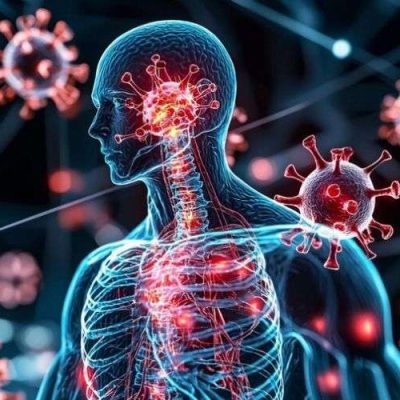MBBS, MD, DM (Clinical Haematology)
Principal Director & Chief Hematology at Fortis Hospital
MBBS, MD, DM (Clinical Haematology)
Principal Director & Chief Hematology at Fortis Hospital
Can Bone Marrow Transplants Cure Autoimmune Disorders? Understanding the Benefits

Autoimmune Disorders
Contact Us
Related Videos :
FAQs
Bone marrow transplants have shown promise for diseases like multiple sclerosis, lupus, and systemic sclerosis.
The transplant “resets” the immune system by replacing the faulty immune cells with healthy ones, potentially halting the autoimmune attack.
Risks include infections, graft-versus-host disease, and other complications, though these are minimized when performed by experienced professionals like Dr. Rahul Bhargava.
Recovery can take several months, and patients need close monitoring during this time.

Autoimmune disorders affect millions of people worldwide, disrupting their immune system and causing their body to attack healthy tissues. Traditional treatments often focus on symptom management, but new research is revealing the potential of bone marrow transplants in autoimmune disorders. Could this advanced procedure offer a cure? In this post, we’ll explore how bone marrow transplants work, their benefits, and why experts like Dr. Rahul Bhargava are pioneering this approach in treating autoimmune diseases.
Understanding Autoimmune Disorders
What Are Autoimmune Disorders?
Autoimmune disorders occur when the immune system mistakenly attacks the body’s own cells, mistaking them for harmful invaders. These disorders can affect nearly any part of the body, leading to chronic inflammation, pain, and dysfunction. Examples of autoimmune diseases include multiple sclerosis (MS), rheumatoid arthritis (RA), lupus, and Type 1 diabetes.
Common Causes of Autoimmune Disorders
While the exact causes of autoimmune disorders are still being studied, certain factors increase the risk. These include:
- Genetic predisposition – A family history of autoimmune diseases can raise your risk.
- Environmental triggers – Exposure to toxins, infections, or certain medications can initiate the disease process.
- Hormonal factors – Many autoimmune diseases are more common in women, suggesting a link to hormones.
Symptoms of Autoimmune Disorders
The symptoms of autoimmune diseases can vary widely depending on the specific condition, but common signs include:
- Chronic fatigue and weakness
- Joint pain and swelling
- Skin rashes or lesions
- Muscle aches and stiffness
- Organ-specific issues (e.g., kidney problems in lupus, nerve damage in multiple sclerosis)
Patients often face long-term management of these symptoms, typically through medications designed to suppress the immune response.
What is a Bone Marrow Transplant?
A bone marrow transplant (BMT) is a medical procedure that replaces damaged or diseased bone marrow with healthy cells. It’s primarily used for treating blood-related conditions such as leukemia and lymphoma. However, medical research is now exploring the role of bone marrow transplants in resetting the immune system for people with severe autoimmune disorders.
Types of Bone Marrow Transplants:
- Autologous transplant: This involves using the patient’s own stem cells, which are harvested and reintroduced after chemotherapy or radiation.
- Allogeneic transplant: This uses stem cells from a donor, ideally a genetic match, to rebuild the immune system.

How Bone Marrow Transplants Can Help Autoimmune Disorders
In the context of autoimmune diseases, a bone marrow transplant can “reboot” the immune system. The idea is to destroy the immune cells that are causing the autoimmune attacks and replace them with healthy cells through a transplant. This new immune system may no longer recognize the body’s own tissues as foreign, potentially leading to remission or even a cure for the autoimmune disorder.
Recent studies have shown encouraging results, particularly for diseases like multiple sclerosis and lupus, where conventional treatments fail to provide long-term relief. According to research, patients who undergo bone marrow transplants can experience reduced symptoms, longer periods of remission, and even a complete halt in disease progression.
Benefits and Risks of Bone Marrow Transplants for Autoimmune Disorders
Benefits:
- Long-term remission: Bone marrow transplants may lead to extended periods without symptoms.
- Reduced medication dependency: Many patients find that they no longer need immunosuppressive drugs after a successful transplant.
- Potential to halt disease progression: By resetting the immune system, bone marrow transplants can stop the ongoing damage caused by autoimmune disorders.
Risks:
- Graft-versus-host disease (GVHD): This is a risk with allogeneic transplants, where the donor cells attack the recipient’s tissues.
- Infections: The immune system is weakened during the transplant process, making patients more susceptible to infections.
- Other complications: Bone marrow transplants are complex procedures and carry risks, such as organ damage and secondary cancers.
This is why undergoing the procedure in specialized clinics with experienced doctors, like Dr. Rahul Bhargava, is crucial for minimizing risks and ensuring successful outcomes.
Why Choose Dr. Rahul Bhargava for Bone Marrow Transplants?
Expertise and Experience
Dr. Rahul Bhargava is a renowned hematologist and a leading expert in bone marrow transplants. With decades of experience, he has successfully treated patients with complex autoimmune diseases through innovative transplant techniques. His deep understanding of both the procedure and the complexities of autoimmune conditions makes him a sought-after specialist.
Proven Track Record
Dr. Bhargava has performed numerous successful bone marrow transplants, helping patients with severe autoimmune diseases regain control over their health. His commitment to research and patient care has positioned him at the forefront of this evolving treatment field.
Personalized Care and Advanced Facilities
Dr. Bhargava’s clinic offers cutting-edge facilities, ensuring that each patient receives the highest standard of care. His personalized treatment plans are tailored to each patient’s unique condition, providing the best chance of success.
Patients undergoing a bone marrow transplant in autoimmune disorders under his care benefit from a highly experienced team and access to the latest medical technologies.
Conclusion
While traditional treatments for autoimmune disorders focus on symptom management, bone marrow transplants offer a new hope for patients looking for long-term remission or a cure. By “resetting” the immune system, this innovative approach holds promise, especially for those with severe, treatment-resistant diseases.
If you or a loved one is struggling with an autoimmune disorder and conventional treatments are no longer effective, consulting with an expert like Dr. Rahul Bhargava could be a game-changer. His experience and dedication to advanced care make him an ideal partner in your journey toward better health.